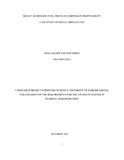| dc.description.abstract | The project overall objective was to investigate the impact of hedging fuel prices on corporate profitability, a case study of Kenya airways ltd. The study is of significance to the top management of KQ; they will be able to know how hedging has impacted the company‟s profits for the last six years, and be able to manage the hedging process more efficiently. The potential investors in airline business will also benefit since with the knowledge of factors the risk management strategies employed by their agent and how they impact on profitability, will enable them to gain or loose confidence with the management of the organization. The study is also expected to benefit students who have had to content with making generalizations about situations based on the studies carried outside especially in the developed countries. They will thus be able to cite local examples with confidence. To the scholars and academics, the study will serve as a guide for further research in the areas of hedging of fuel prices in an airline firm and other large fuel consuming companies. The government as well as the providers of services to put up standards for fair competition in the industry. The researcher faced several problems during the collection of data such as suspicion and contempt from the two management staff interviewed through email, as they believed that such information is too crucial to the success of the organization and if leaked out to competitors, it could cause the organization huge losses. Interpretation of financial statements especially the notes was a challenge given that the researcher does not form part of the management accounting team. To find literature on previous studies done on this subject was a problem since there were limited references. Different authors have commented differently on issues relating to hedging of fuel prices and therefore the researcher referred to several author who had raised issues whether to hedge fuel prices or not, why business organizations hedge fuel prices and impacts of hedging on business organizations profitability.
The researcher used a survey to collect data, and interviewed two management staff in charge of hedging contracts in Kenya airways. A survey was used because secondary data was the main source of data collection, and annual financial reports were available at the organizations website. The population was annual financial reports for the years 2000 to 2011. The data was analyzed using SPSS version 18. Line graphs and multiple regression analysis models were used to present the data. The two management staff of Kenya airways saw the importance and need for hedging fuel prices, they however cautioned that even though one of the most important reasons why organizations hedge fuel prices is to reduce profits volatility, it‟s always not so because it is not easy to predict the exact loss or profit on hedging in any particular planning period. This is also picked up by the researcher in the analysis of the annual financial statements of Kenya airways. The researcher also concluded that there is a direct relationship between hedging fuel prices and corporate profitability and most of the time the relationship is positive. The research findings recommended that all large fuel consuming companies should contemplate hedging fuel prices especially in a difficult economy like today, they should however be highly skilled in the risk management strategy because it involves a lot of statistical work to arrive at a congruent decision. The researcher also recommended hedging fuel prices for the Matatu industry in Kenya, and even the common man. This is practiced and working very well in the United States. There is however need to stiffen the regulation in regard to hedging in the country since they leave out important and serious legal aspects. Hedging is the way to go for large fuel consuming companies. | en |

